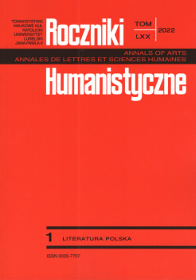A Sarmatian Odysseus: Jan Łaski in Andrzej Trzecieski’s Epicedium
Abstract
This paper offers an interpretation of selected motives from the epicedium commemorating the personage and activity of the humanist and prominent religious reformer Jan Łaski the Younger who died in Pinczów on 8th January 1560 (Ioannis a Lasco viri clarissimi epicedion). Andrzej Trzecieski (Tricesius, ca. 1525 – post 1584) was the author of many Latin epigrams, elegies, epitaphs, epicedia and laudatory poems.
In the funeral elegy for Łaski, he creatively reshaped the structure of the ancient epicedium, including the traditional elements of comploratio (mourning), laudatio (praise of the deceased) and consolatio (consolation). He did his utmost to present Łaski as a man well-known for his piety, a venerable old man renowned for his many virtues, and, most of all, a new prophet announcing the rebirth of the Church. In this context, Trzecieski evokes three examples of illustrious orators: St. John Chrysostom (‘the golden-mouthed’), the gallic Hercules and Odysseus “of the many twists and turns” (polytropos).
References
Abramowska, Janina. „Alegoreza i alegoria w dawnej kulturze literackiej”. Problemy odbioru i odbiorcy, red. Tadeusz Bujnicki i Janusz Sławiński, Ossolineum, 1977, ss. 123-148.
Bacchi, Elisa. „Hercules, Silenus and the Fly: Lucian’s Rhetorical Paradoxes in Erasmus’ Ethics”. Philosophical Readings, vol. 11, no. 2, 2019, ss. 120-130.
Bartel, Oskar. Jan Łaski. Neriton, 1999.
Brückner, Aleksander. Jan Łaski. Neriton, 1999.
Brzozowski, Jacek. Muzy w poezji polskiej. Dzieje toposu do przełomu romantycznego. Ossolineum, 1986.
Chrobot, Agata. Carmina Maiora Andrzeja Trzecieskiego. Próba monografii. Wydawnictwo Uniwerystetu Jana Kochanowskiego, 2014.
Culler, Jonathan. The Pursuit of Signs: Semiotics, Literature, Deconstruction. Routledge, 2001.
Curtius, Ernst Robert. Literatura europejska i łacińskie średniowiecze. Tłum. i oprac. Andrzej Borowski. Universitas, 2005.
Cytowska, Maria. „Erazmianizm w literaturze polskiej XVI–XVII wieku”. Studia porównawcze o literaturze staropolskiej, red. Teresa Michałowska i Jan Ślaski, Ossolineum, 1980, ss. 7-28.
Cytowska, Maria. „Stanisław Łaski jako tłumacz Erazma z Rotterdamu”. Meander, nr 7, 1959, ss. 362-368.
Fijałkowski, Tomasz. „Erazm z Rotterdamu a literatury dysydenckie w Polsce XVI wieku”. Prace Polonistyczne, ser. 27, 1971, ss. 245-266.
Hallowell, Robert E. „Ronsard and the Gallic Hercules Myth”. Studies in the Renaissance, vol. 9, 1962, ss. 242-255.
Helsztyński, Stanisław. Reformator Sarmacji. Opowieść Cypriana Bazylika o Janie Łaskim 1592. Ludowa Spółdzielnia Wydawnicza, 1981.
Janakowski, Marcin. „Między faktami a panegiryzmem. Śladami młodzieńczych lat i peregrynacji Hieronima, Jana i Stanisława Łaskich”. Przegląd Nauk Historycznych, r. 17, nr 2, 2018, ss. 67-100.
Jürgens, Henning P. Jan Łaski 1499-1560. Europejczyk doby reformacji. Tłum. Genowefa Olejnik. Semper, 2006.
Jürgens, Henning P. Johannes a Lasco in Ostfriesland: der Werdegang eines europäischen Reformators. Mohr Siebeck, 2002.
Korespondencja Erazma z Rotterdamu z Polakami. Tłum. i oprac. Maria Cytowska. PIW, 1965.
Kowalska, Halina. Działalność reformatorska Jana Łaskiego w Polsce 1556-1560. Neriton, 1999.
Krókowski, Jerzy. Andrzej Trzecieski. Poeta-humanista i działacz reformacyjny. PIW, 1954.
Kupińska, Zofia, „Motywy tematyczne w Tristiach Klemensa Janicjusza”. Roczniki Humanistyczne, t. 34, z. 3, 1986, ss. 121-133.
Marczuk, Barbara. „Hercules Lybius, Gallicus, Christianus. Pierre Ronsard wobec legendy i alegorezy”. Prace Herkulesa – człowiek wobec wyzwań, prób i przeciwności, red. Maria Cieśla-Korytowska, Olga Płaszczewska, Wydawnictwo UJ, 2012, ss. 45-58.
Margolin, Jean Claude. „Erazmianizm Jana Łaskiego”. Odrodzenie i Reformacja w Polsce, t. 9, 1964, ss. 75-84.
Milewska-Waźbińska, Barbara. „Vitae archiepiscoporum Gnesnensium Klemensa Janickiego – geneza i wczesna recepcja”. Symbolae Philologorum Posnaniensium Graece et Latine, t. 27, z. 1, 2017, ss. 83-91.
Mosdorf, Jadwiga. „Uwagi o łacińskich źródłach twórczości Andrzeja Trzecieskiego”. Pamiętnik Literacki, t. 52, z. 4, 1961, ss. 530-533.
Plett, Heinrich F. Rhetoric and Renaissance Culture. De Gruyter, 2004.
Ptaszyński, Maciej., Reformacja w Polsce a dziedzictwo Erazma z Rotterdamu. Wydawnictwa Uniwersytetu Warszawskiego, 2018.
Rodgers, Dirk Wayne. John a Lasco in England. Peter Lang, 1994.
Ryczek, Wojciech. „Politropia: retoryka Odyseusza”. Teksty Drugie, z. 5, 2015, ss. 336-356.
Tafiłowski, Piotr. Jan Łaski (1456-1531), kanclerz koronny, prymas Polski. Wydawnictwa Uniwersytetu Warszawskiego, 2007.
Urban-Godziek, Grażyna. Elegia renesansowa. Przemiany gatunku w Polsce i Europie. Universitas, 2005.
Walewski, Cyprian. Jan Łaski, reformator Kościoła. Wiadomość historyczno-bibliograficzna. Biblioteka Warszawska, 1872.
Zabłocki, Stefan. Polsko-łacińskie epicedium renesansowe na tle europejskim. Ossolineum, 1968.
Copyright (c) 2022 Roczniki Humanistyczne

This work is licensed under a Creative Commons Attribution-NonCommercial-NoDerivatives 4.0 International License.





